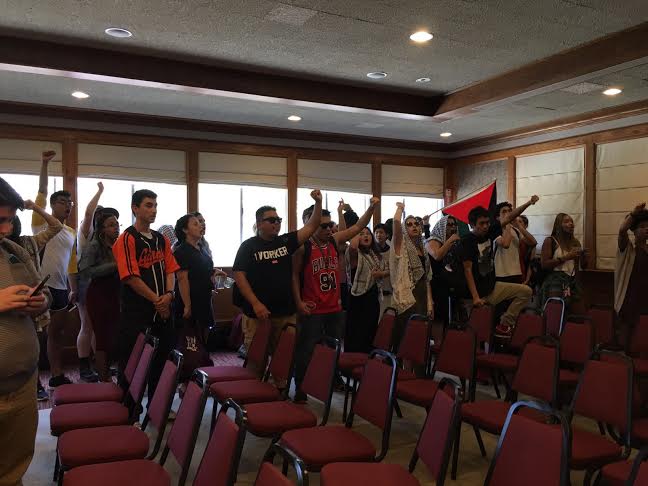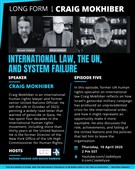[The following report back was submitted to Jadaliyya by the students are San Franscisco State University that protested Hillel-sponsored speech of Nir Barkat, the mayor of occupied Jerusalem.]
With the unwavering commitment to social justice that is central to the work of the university, SF State prepares its students to become productive, ethical, active citizens with a global perspective.
-SFSU Mission Statement
On 6 April 2016 Nir Barkat, the mayor of occupied Jerusalem, gave a speech sponsored by Hillel San Francisco State University (SFSU) chapter titled, “How is a visionary from the high-tech sector leading a diverse and scrutinized city?” The event has led to scrutiny in the blogosphere and by the SFSU administration because of the protests that ensued.
Why We Protested
The protest was led by a coalition of students representing a multiplicity of communities, ethnicities, and backgrounds who stand in solidarity for the freedom of Palestine. We protested Mayor Barkat because of his role as an Israeli official, who enforces violence and occupation against our communities on a daily basis.
Providing a platform for Barkat on our campus erases the violent and brutal realities faced by Palestinians. The Israeli technological sector underpins and makes possible the Israeli military occupation, the structures of apartheid in Palestine, and the denial of the right to return for Palestinian refugees. Technological infrastructures within Jerusalem are at the center of the destabilization of Palestinian society. They contribute to the daily and entrenched forms of humiliation of indigenous Palestinians, including the vast system of military checkpoints, forced dispossession, and home demolitions. As ethical and active students with a global perspective, committed to social justice and anti-colonialism, we objected to the event that served in justifying and whitewashing apartheid and normalizing violations of international law. Barkat’s message and tour reinforces Islamophobia and anti-Arab racism globally. Examples of policies implemented and/or run by Barkat include:
- The Jerusalem Master Plan, an official city policy that calls the Palestinian presence in the city “a demographic threat.” The Plan implements ethnic cleansing policies with an intended seventy percent Jewish and thirty percent Palestinian demography by the year 2020.
- Calls for the raiding and demolishing of homes, shootings of gas canisters into residential areas, arrests of children, blocking off roads for Palestinians, and the building of illegal settlements in East Jerusalem.
- Revoking citizenship of Palestinian families whose family members were killed by Israeli forces in the recent Palestinian intifada or uprising, in October 2015.
- Supporting policies that forbid Palestinians from renting housing in Jerusalem and policies that oust Palestinians from Israeli Universities.
- Denial of Palestinian neighborhoods’ access to municipal services such as waste removal, which in turn threatens public health.
As students, we are deeply disturbed that our university, which claims to advocate for social justice, is actively involved in creating safe spaces for hate speech and the promotion of international law violations by offering a stage for Barkat. It is our responsibility as student leaders for equality to act ethically and stand up against oppression wherever it may occur, including in Palestine.
Clarifications on Meanings behind Slogans Used During Protest
“Long Live the Intifada!” The term “intifada” emerges from the Palestinian anti-colonial struggle, referring to a “shaking off” of the Israeli occupation of Palestine. Claims that it means the eradication of a Jewish presence in Palestine, or condones violence against Jews, are unfounded. This is not how we used it. Students participating in the protest consciously use the term within the “shaking off” framework of anti-colonial struggle. To us, intifada means the struggle for freedom, justice and equality for all people.
“From the River to the Sea Palestine will be Free” It envisions a liberated Arab world free from colonial and racist reigns. The statement does not condone or warrant anti-semitism. We, social justice minded students, recognize combating anti-semitism as central to the struggle in fighting for justice and freedom of all people. The term refers to a liberation of Palestine and centers the importance of a right of return for the near six million Palestinian refugees in exile.

On the Administration’s Response
On 7 April, President Wong sent an email to the university titled “Civil Discourse” calling for an investigation of the protesters. Such acts criminalize anti-racist speech on campus which voices an end to the occupation of Palestine. The attack on pro-Palestine protesters sends the message that anti-Palestinian hate speech is protected and tolerated as freedom of expression by the SFSU administration, but freedom of expression for social justice is systematically criminalized and condemned. President Wong at the Arab Cultural and Community Center in 2013 promised to break the cycle of double standards, censorship, and criminalization of Arab, Muslim and Palestinian student centered activism on campus. Today, we demand that he stay true to that promise, emphasizes the safety of his students by condemning threats from third party organizations and stand with the students united for social justice and a liberated Palestine.
La Lucha Sigue, The Fight Continues, Long Live International Solidarity, Free Palestine!
-SFSU Students Who Protested Jerusalem Mayor
![[Students protesting the Nir Barkat`s speech at SFSU on 6 April 2016. Photo by SFSU student]](https://kms.jadaliyya.com/Images/357x383xo/66715ac3-ad6a-4cb8-8f00-87bad10a975e.jpg)

















